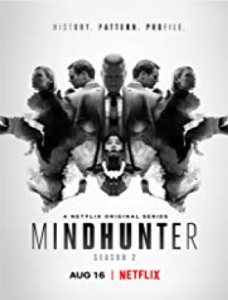On behalf of the American Studies Blog, we would like to extend our sincerest congratulations to Lauren Solomon whose winning entry in the category “Best Books & Fabulous Films” can be read below.
Mindhunter: Harnessing the Minds of Monsters
Nothing captivates an audience like the inhuman and horrific acts of a serial killer. After Conversations with a Killer: The Ted Bundy Tapes aired on Netflix in January 2019, followed in May by the release of the biographical crime thriller, Extremely Wicked, Shockingly Evil and Vile, also based on the Ted Bundy story, the U.S. has become mesmerized by stories of serial killing. With that rising fascination, people can’t seem to stop talking about the second season of Mindhunter.
Mindhunter is a crime thriller television series on Netflix inspired by the nonfictional book, Mindhunter, written by John E. Douglass and Mark Olshaker. The book’s narrator is a renowned former FBI Special Agent who pioneered the development of psychological profiling by studying the behavior of violent defenders.
Criminal psychology as a means of identifying and locating perpetrators wasn’t used in law-enforcement until the late 1970s. In fact, the term “serial killer” wasn’t invented until the late 70’s, let alone passed around in typical investigative jargon. Although the book is based entirely on nonfictional events, the TV series, also set in the 70s, follows the stories of several fictional characters that have been assigned to a task force – the newly established FBI Behavioral Science Unit. The agents must begin to collect data by interviewing incarcerated criminals that have been convicted of multiple violent crimes. These interviews are supposed to determine the compulsions which lead people to kill in sequences.
As the task force collects data, they develop theoretical profiles for common types of serial killers. The agents are frequently called to assist in current open cases with possible fingerprints by serial killers as a way to test their newly developed theory. While they’re sometimes successful, their work doesn’t instantly or easily progress. The task force experiences a plethora of obstacles while trying to implement their new findings in practice: pressure from FBI colleagues, limited financial resources, resistance from local law enforcement, and personal setbacks resulting from working in extremely stressful and unsettling environments.
Every serial killer provides an extremely chilling and captivating performance. Mindhunter is about more than killers and their unthinkable actions – it’s a psychological thriller that requires a task force to get inside a killer’s head to rationalize what a sane mind would identify as irrational. In other words, mentally sound people have to ignore their inner moral compass and make sense of the obscene behavior of an extremely violent and often unremorseful murderer. What makes a person behave this way? Was it their childhood? Have they experienced trauma? Were they born this way? As fictional character Agent Bill Tench says in an interview with David Berkowitz, a.k.a. The Son of Sam, in the novel: “If you want to learn how to paint, go straight to the artist.”
But what about a sound mind? Is it affected by this type of work? Is it destabilizing to constantly immerse a person, or a group of people, into the tormented minds of the criminally insane? The main characters constantly struggle with sleep deprivation, alcohol abuse, depression, anxiety, and panic attacks. Their relationships with people outside of work are challenging and complicated. After all, the behavior of Ed Kemper – a rapist, murderer, and necrophiliac – doesn’t really make for an appropriate dinner conversation.
Depending on the subject, the agents are successful if they manage to demonstrate a connection between themselves and the person they’re interviewing. In order to establish this sense of security with the subject, they share personal details. Sometimes, the agents fabricate stories to create these connections, but in order for the serial killer to believe them, their stories usually contain a painfully significant grain of truth. The agents must look inside themselves to find similarities with the demented, infamous serial killer seated across the table.
These are the scenes that are especially gripping. They capture the audience in a unique and uncomfortably horrific manner – by emphasizing the real reason we’re so terrified of and interested in these monsters. Mindhunter forces us to face the deep, dark question we never want to ask ourselves: “How much of that inhuman monster resides within myself? My neighbors? My friends? My family? My kids?”
19,628 Total Views, 13 Views Today







